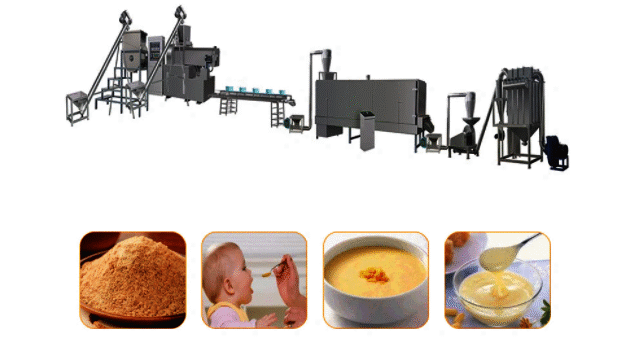What are the benefits of baby food?
We all know that when a baby grows to a certain stage, in addition to breastfeeding, some other baby food needs to be added. There are many types of baby food. The Baby Food Production Line can produce many types of baby food. Baby food is very important to the growth and development of babies. There are many benefits. What are the benefits of baby food?
1. Provide the nutrition that babies need
The nutrition provided by different types of baby foods is also different. Adding baby foods should be diversified, including protein, vitamins, calcium, iron, zinc, etc., to ensure that the baby’s nutritional intake is comprehensive and balanced. Food can meet the needs of babies' growth and development.
2. Cultivate new eating habits
In the beginning, babies are mainly breast milk. Adding complementary foods to babies can slowly quit their dependence on breast milk, eat different foods, and adapt to different foods, which is conducive to cultivating good eating habits.
3. Promote tooth development
The addition of complementary food is also the period of baby teeth development. Appropriate addition and conversion of complementary food styles can provide sufficient nutrition for tooth germination and promote tooth development. At the same time, tooth development can also help babies chew food better.
4. Promote intestinal development
When a baby eats food, it must first go through oral chewing and stomach digestion, and then enter the intestines for digestion again. The intestine breaks down the food into various nutrients to provide nutrition for the baby. The development of the intestines affects the growth of the baby. Has a very important role.

5. Cultivate language skills
The addition of supplementary food is of great help to infants’ intellectual development, especially language development. Because foods of different shapes, sizes, and hardnesses can train the baby's tongue, teeth, and the coordination of the oral cavity, promote oral function, especially the development of the tongue, and can make language expression more perfect.
6. Train the ability to chew and swallow
From sucking breast milk to eating baby food, there is an adaptation process. From sucking to chewing and swallowing, it takes a certain amount of time. To feed the baby with complementary food, the baby will learn to chew and swallow food, which can train the baby's ability to chew and swallow.
7. Cultivate taste habits
The period from six months to two years of age is a critical period for the baby’s taste development. During this period, feeding babies with different flavors of food can allow babies to have different experiences with various foods and taste different flavors of food, which is conducive to Cultivate the baby's taste habits.
8. Get ready for weaning
Baby food does not only refer to the food used when the baby is weaned, but refers to the transitional food added during the period from single breastfeeding to complete weaning. This stage mainly provides the baby with liquid and mashed food, including rice noodles, vegetable puree, fruit puree, liver puree, meat puree, etc.

When adding baby food supplements at the beginning, take it slowly and follow the rule of adding from less to more, from thin to thick. When the baby grows up, you can increase the types of complementary foods. If the types of baby foods are not abundant , It will cause imbalanced nutritional intake and affect the growth and development of babies.
Therefore, in order to achieve the goal of balanced nutrition, the types, quantities, and methods of complementary foods are exquisite, and adult food cannot be used as a baby's complementary food at will. Baby Food Production Line can produce many types of baby food, and the products are all very high-quality and healthy. It is the best equipment for producing baby food.












